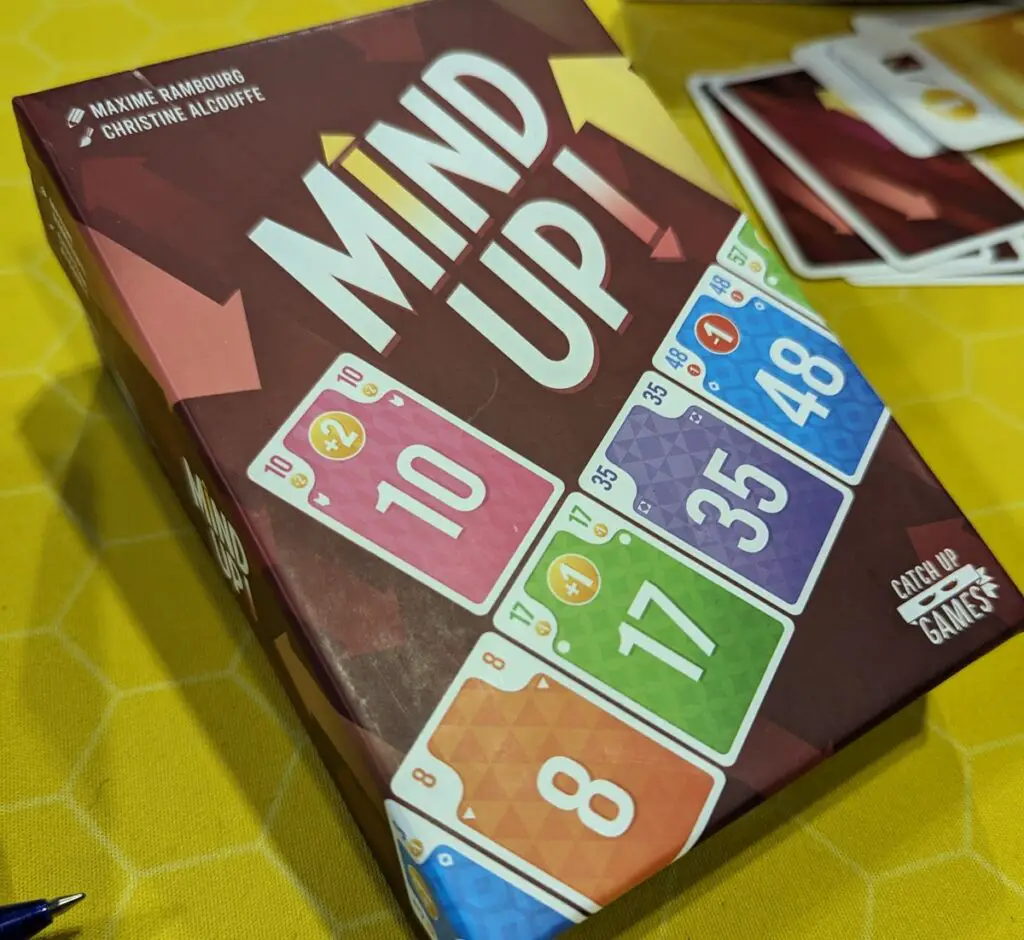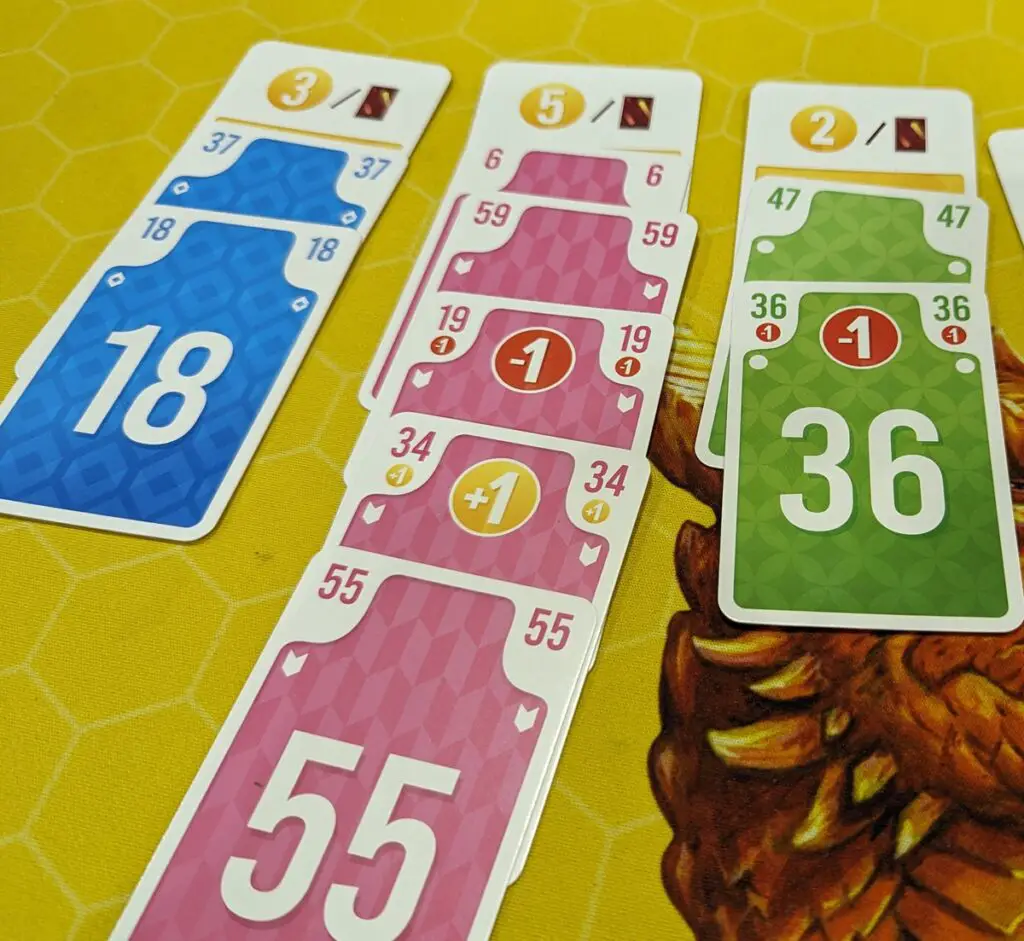Here at Let’s Play Games HQ, we’re always on the lookout for clever, engaging board games that challenge the mind without melting it. Mind Up caught our attention for its unique twist on card drafting and turn-based strategy. I’ve spent plenty of hours playing this one at different player counts, and I’ve got thoughts, lots of them. So, let’s get into it.

What’s in the Box?
Mind Up is neatly packaged, with components that are both functional and visually appealing. Inside the box, you’ll find:
- 90 Numbered Cards – These are the heart of the game, with a bright, simple design that makes them easy to read.
- Player Markers – Used for turn order and adding that little bit of extra tension when revealing picks.
- Score Pad – Because let’s be honest, trying to keep score in your head is a sure path to chaos.
- Rulebook – Straightforward and well laid out, though I still had to double-check a couple of things during the first game.
The components are decent quality, nothing groundbreaking, but they do the job well. It’s a small-box game, which means it’s easy to throw in a bag for game nights or travel.
Key Facts
- Number of Players: 2–6
- Approximate Game Time: 20–30 minutes
- Publisher: Catch Up Games (UK distribution may vary)
- Type of Game: Card drafting, hand management, strategic planning
- Complexity: Light to medium
How to Play Mind Up
At its core, Mind Up is a game about predicting what others will do and adapting accordingly. Here’s how a typical game flows:
- Each player is dealt a hand of numbered cards. Everyone selects one card to play, then places it face-down.
- Once all players have chosen, the cards are revealed simultaneously. Turn order for that round is based on the numbers selected, lowest going first.
- Players draft from a shared row of cards. The aim is to build the best sequence possible for scoring points.
- At the end of the round, the newly acquired card stays in front of each player. Over multiple rounds, these form a sequence, and positioning matters for scoring bonuses.
- Repeat until all rounds are played, then tally scores.
There’s a lot more to it than that, but those are the basics. The key is anticipating what your opponents will pick, ensuring you don’t get stuck with cards that don’t fit your strategy.
Player Counts: Does it Work at Every Size?
I’ve played Mind Up at different player counts, and it’s one of those rare games that scales well:
- 2 Players – A more controlled, head-to-head battle where reading your opponent is crucial. Played with a dummy player
- 3–4 Players – Probably the sweet spot, as there’s enough unpredictability to keep things interesting without feeling chaotic.
- 5+ Players – Things get wild. Turn order becomes trickier to manage, and predicting what will be left for you becomes near impossible (but in a fun way).
The experience shifts depending on the player count, but it never feels broken. That’s a big plus in my book.
Strategy: It’s Not Just About Numbers
Mind Up looks deceptively simple, but there’s a surprising amount of strategy involved. Do you play it safe and try to maintain a controlled sequence, or do you gamble on higher-value cards, hoping to snipe a perfect pick? Timing is everything, and reading your opponents adds a layer of depth that keeps each game fresh.

It reminds me of games like 6 Nimmt!, where you’re constantly second-guessing yourself, but it has a more structured draft mechanism that feels distinct.
Digital Versions: Play Anytime, Anywhere
Mind Up is available on Board Game Arena, which means you can play it online against friends or random players. The digital implementation works well, especially for learning the rules, and it’s a great way to get in a quick game when you don’t have the physical copy handy.
Similar Games You Might Like
If you enjoy Mind Up, you might also like:
- 6 Nimmt! – Another number-based game with a bit of a “push-your-luck” element.
- Scout – Shares the idea of sequencing numbers strategically.
- Point Salad – If you enjoy quick drafting games with simple yet deep mechanics.
- Lost Cities – Different vibe but similar in how you manage sequences of numbers.
Each of these games scratches a slightly different itch, but all of them involve making smart choices under limited conditions.
Final Thoughts: Is Mind Up Worth Playing?
Absolutely. It’s the kind of game that’s easy to teach but keeps players engaged, whether they’re casual gamers or more serious strategists. It works well at any player count, has just the right amount of interaction, and offers solid replayability. Plus, it doesn’t overstay its welcome games are quick and satisfying.
It’s earned a regular spot in my collection, and if you enjoy games that challenge your ability to think ahead, it’s worth giving a go.
